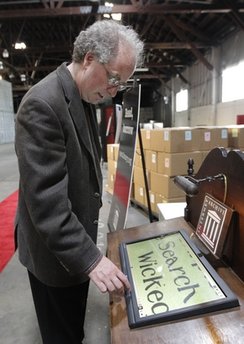The creator of archive.org is building a "Noah's Ark" for printed books.

Today I came across a very interesting news: Brewster Kale, the creator of the archive.org service, which is often called the Internet Archive, creates a repository of printed books, where he hopes to collect all ever-printed books, one copy of each book. If anyone has heard of the World Seed Storage on Spitsbergen , can trace the analogy between these two projects. By the way, Brewster Kale has already begun to implement his project, and collected about 500 thousand books.
The first of its storage may well fit up to a million copies of books, after which the construction of a larger storage will begin. Books here are not on the shelves, but are stored in special containers, each of which is equipped with climate control. Each container can hold up to 40 thousand volumes. In order to facilitate the classification of stored books, each of them is given its own barcode. Barcodes are indicated and containers.
')
Brewster claims that he collected the first 500 thousand books so easily that he sees no difficulty in accumulating 10 million copies of publications - and this is already the equivalent of a library of a large university. The idea, as mentioned above, is to store all books ever printed in a single copy. Of course, the work on the collection and classification of books is not carried out by Brewster himself, but by specially trained personnel. Project participants, before placing the book in the repository, contribute it to the database. Sometimes there are copies of books that are already in storage - in this case, Brewster gives these books to various organizations.
Brewster considers digitization to be a completely reliable way of preserving books, but he also argues that for greater safety, you must also take care of printed books. Brewster Kale is also the initiator of the Open Library project, a digital library, which the author of the project considers to be the analogue of the famous Alexandrian Library. As part of the Open Library project, about 3 million books have already been digitized, each of which can be obtained free of charge by any Web user who is interested in a publication from this library.
Kale believes that his project for the storage of printed books is not an analogue of the Library of Congress, but an analogue of the very seed store mentioned above.
Via yahoo
Source: https://habr.com/ru/post/125445/
All Articles